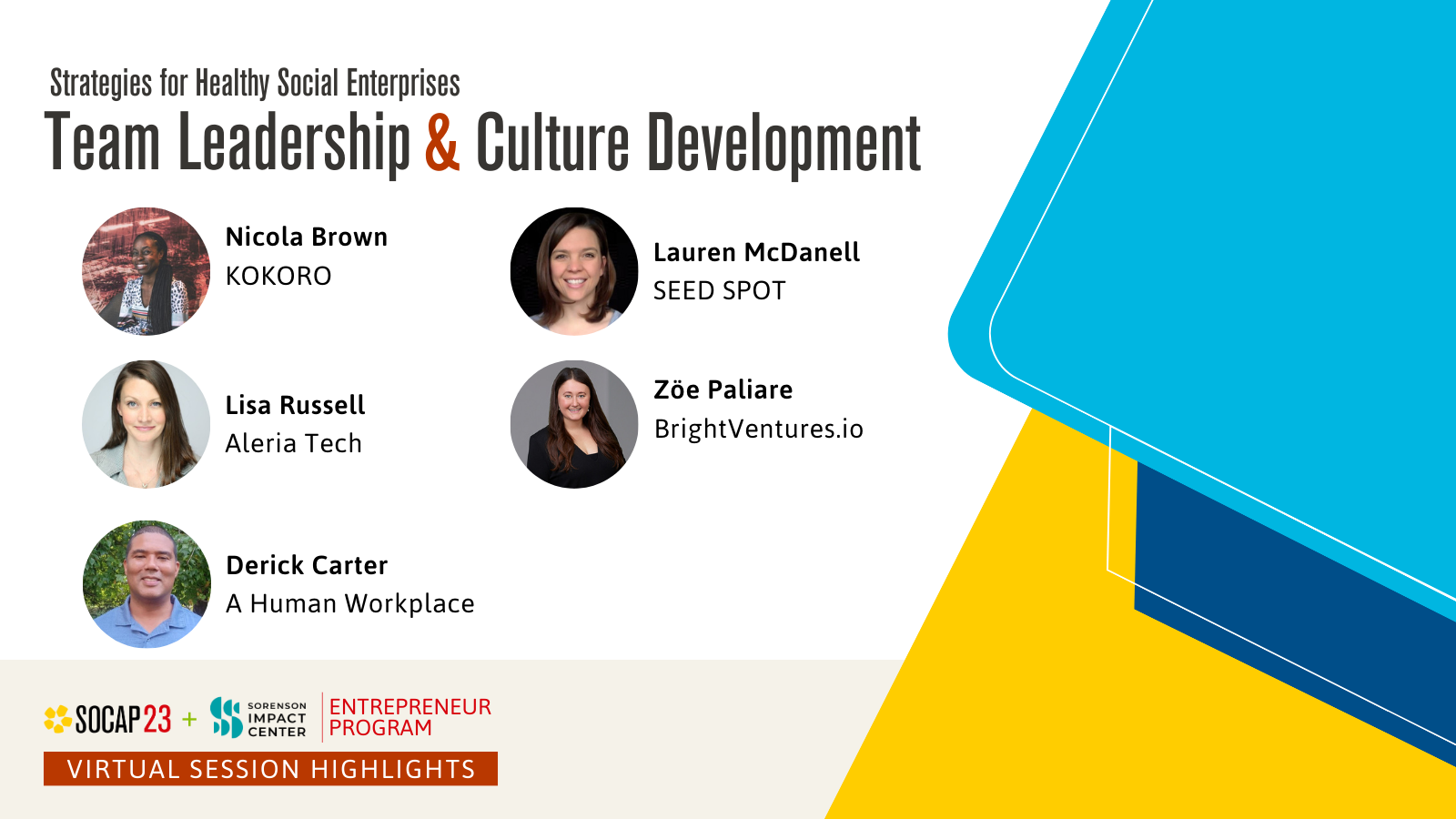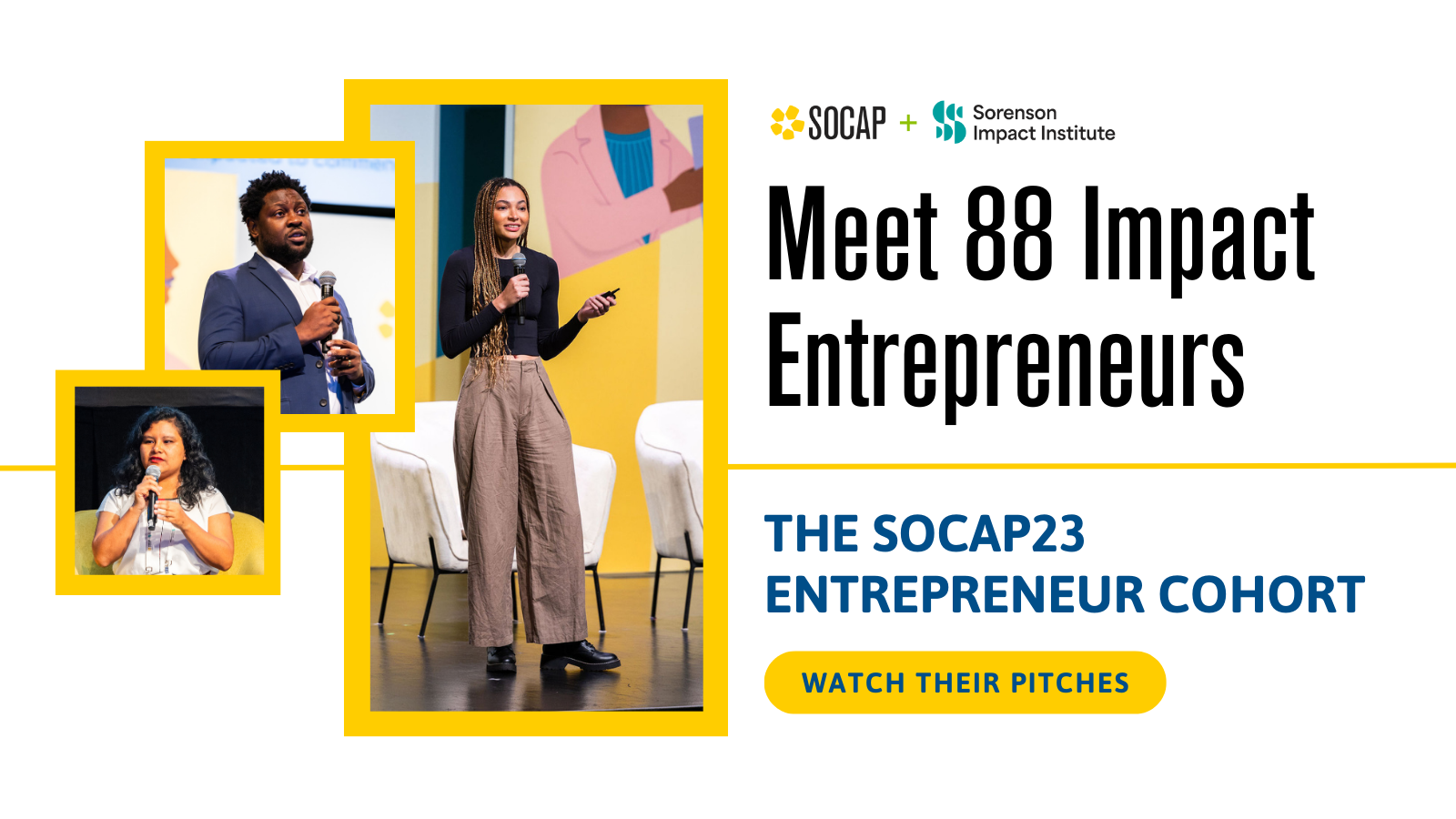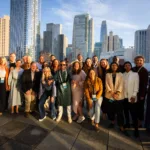Strategies to Shape and Build Healthy Social Enterprises
While scaling a social enterprise, founders are tackling some of the world’s big challenges while also facing decisions on organizational structure and values. This year’s SOCAP23 Entrepreneur Program includes six monthly strategy tracks — including May’s sessions on team leadership and culture development — to help founders enhance their impact and develop a nurturing framework for their businesses.
The virtual sessions for founders are facilitated by a variety of subject matter experts. We’re grateful for the knowledge, time, and guidance they are sharing with the founders and the broader SOCAP community.
At SOCAP23, you can hear from the SOCAP23 Entrepreneur Program cohort when they present on stage about the unique challenges their companies are addressing. They’ll also be actively connected to funders through deal rooms. Register now to join them October 23-25 at Yerba Buena Center for the Arts in San Francisco.
Find highlights and takeaways from the May sessions below, see April’s highlights on holistic wellness here, and watch for additional highlights in the months leading up to SOCAP23.
Money and Emotions
Presented by Nicola Brown, Founder of KOKORO, a digital platform and community of personal science that enables leaders to think, learn and create health.
Takeaways and highlights:
- What’s a memory of joy you have with money? There seems to be a feeling of a need for control when it comes to money in terms of how you make it, how you manage it, and how you use it. There are so many stressful emotions that affect us when it comes to money and this feeling can stay with us our entire life.
- Think about your recent money interactions or transactions: How did you feel about each one? Does this feeling come from a sense of wanting to control the situation? It’s important to think about money in terms of a sense of abundance, even if you don’t currently have an abundance of money; this can help to change your feelings toward money and attract new energies regarding it.
- How would you define your relationship with money? In our journey with our relationship with money, we have moments of transition and tension and a lot of fear associated with money. Think of fear as excitement without breath; the next time you’re feeling fearful, use conscious breathing to move forward.
How to Manage a Remote or Hybrid Office
Presented by Lauren McDanell, Vice President of Strategy and Growth at SEED SPOT, a 501(c)(3) nonprofit empowering diverse, impact-driven entrepreneurs using their business ventures to create social change locally and around the world. SEED SPOT brings together a network of resources, mentors, and partners to make entrepreneurship accessible to all.
Takeaways and highlights:
- As more people shift to hybrid or remote work, leaders should consider how best to connect them with colleagues, reinforce the organization’s mission, and manage productivity expectations.
- Tips for connections with colleagues:
- Provide a way to share kudos with colleagues to build connections and create a supportive culture. SEED SPOT uses the Bonusly service to empower team members to show appreciation.
- Create Slack channels where people can share fun things or discuss common hobbies.
- Use a service to send pre-recorded videos to employees that can be personalized by individuals or the organization.
- Schedule regular team scrums or other brief connections with colleagues.
- Tips for connections with the organization:
- Use an online platform to centralize access to human resource materials, time off requests, and a calendar with important dates. SEED SPOT uses Rippling.
- Anchor the work in core values through regular discussions and performance evaluations. Ask team members if the core values need a refresh.
- Showcase your mission in action. At SEED SPOT, every team member interacts monthly with a beneficiary through stories, photos, Slack, or other tools.
- Tips for connections on productivity:
- Redefine productivity as sustained progress in a positive direction. Discuss and set reasonable expectations for output.
- Realize that each person’s capacity fluctuates over time, and there is no 100% or “normal” amount. Set outcome expectations, then adjust goals and processes to hit them.
- Consider if your goals and deadlines reflect your team’s current capacity, and adjust or prioritize goals accordingly.
- Model healthy productivity as a leader: take vacations, sign off from messages.
Building Inclusive Teams
Presented by Lisa Russell of Aleria Tech, which partners with organizations to measure inclusion in the workplace. When comparing the day-to-day experiences of employees at startups to those of employees at larger companies, employees at startups were two times as likely to feel included at work.
Takeaways and highlights:
- Embrace diversity, equity, and inclusion as different components from the start. Diversity is a measure of individual characteristics that differ from the majority; some are visible and others are unseen. Inclusion has more to do with the experiences that individuals have, the interactions they have within the group, and the interplay between that and the identity of that individual.
- Consider where to focus for quantifiable impact. When looking at an individual within a startup, their contribution is determined by the internal environment. This includes their day-to-day experiences and how safe they feel in taking risks, which can affect overall performance.
- Consider eight workplace categories for inclusion: access, skills use and assignments, compensation and benefits, career and growth, work-life balance, respect, communications, and recognition.
- Incorporate regular recognition to help build an inclusive workplace. With shifts to remote or hybrid work, some people don’t have the casual interactions that can help them feel acknowledged.
How Delegation and Feedback Can Elevate Team Performance
Presented by Zöe Paliare of BrightVentures.io, which partners with companies and leaders to advance inclusive innovation through capital, coaching, and community.
Takeaways and highlights:
- Delegation is the empowerment of another person to act by assigning or sharing authority to carry out specific activities. Feedback is the process of giving constructive information or advice to another person based on performance, skills, or behavior in the workplace.
- Both delegation and feedback are critical components of high-performing teams. By delegating, leaders free up time to focus on higher-level tasks while creating more responsibility, autonomy, and learning for direct reports. Integrating an inclusive feedback loop as a part of delegation allows both the delegator and delegate to learn and integrate new opportunities for growth.
- Common challenges to delegation: authoritative, guilt, resistance, time scarcity, trust.
- Common challenges to feedback: discomfort, unfamiliarity, time scarcity, uncertainty, motivation, shift in relationship.
- Tips for determining what to delegate: Consider who you can delegate to, design the desired outcome, be patient, provide and solicit feedback.
- Tips for inclusive feedback: Express support, highlight opportunities for personal and professional growth, see how the system is affecting employee performance, learn areas for advancement.
Weaving Wellness Into Your Organization
Presented by Derick Carter of A Human Workplace, a global consultancy built around a community of leaders and changemakers who are making work more loving and human.
Takeaways and highlights:
- The COVID-19 pandemic increased awareness of the importance of workplace wellness.
- When starting a business, consider how to weave in wellness. It can look different for each organization.
- Meditation can serve as a tool to reset and get grounded before meetings and a way to bring people together through a few moments of relaxation.
- How to find well-being in an organizational context? Carter’s DNA model has three components: shared purpose, structure, and connection and relationships.
- To change an organization, most people focus on structure, but relationships can be an overlooked way to create change.
- Connection and relationship can be easier for startups but can get lost as the organization grows.
- Realize the importance of leading from within. The biggest predictor of an organization’s well-being is the well-being of its leaders.





